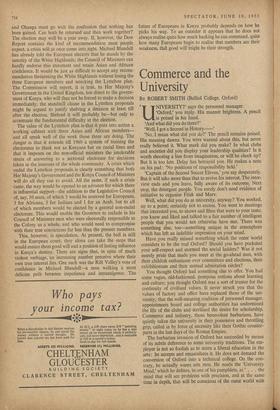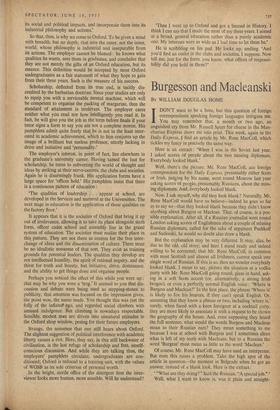Commerce and the University
BY ROBERT SMITH (Balliol College, Oxford) NIVERSITY?' says the personnel manager. 'Oxford,' you reply. His manner brightens. A pencil is poised in his hand.
'And what did you do there?'
'Well, I got a Second in History—' 'No, I mean what did you do?' The pencil remains poised. His meaning dawns. You were warned about this, but never really believed it. What mark did you make? In what clubs and societies did you display your leadership qualities? Is it worth shooting a line from imagination, or will he check up? But it is too late. Delay has betrayed you. He makes a note on his pad : 'No positions of responsibility held.'
'Captain of the Second Soccer Eleven.' you say desperately. But it will take more than that to revive his interest. The inter- view ends and you leave, fully aware of its outcome: Next stop, the detergent people. You surely don't need evidence of initiative to organise Frisk and Marv.
Well, what did you do at university, anyway? You worked, up to a point; certainly not to excess. You went to meetings that interested you, to shows and films that were to your taste; you knew and liked and talked to a fair number of intelligent people that you would not otherwise have met. 'There was something else, too—something unique in the atmosphere which has left an indelible impression on your mind.
Have you really missed something which the outer 'world considers to be the real Oxford? Should you have pocketed your self-respect and stormed the social ladders? Was it not merely pride that made you sneer at the go-ahead men, with their childish enthusiasm over committees and elections, their exhibitionism and their mutual admiration circles?
You thought Oxford had something else to offer. You had some vague, old-fashioned, pompons notions about learning and culture; you thought Oxford was a sort of trustee for the continuity of civilised values. It never struck you that the values of factory and office have replaced those of the uni- versity; that the well-meaning coalition of personnel manager, appointments board and college authorities has undermined the life of the clubs and sterilised the desire for scholarship. Commerce and industry, those benevolent barbarians, have quietly taken the university in their possessive and throttling grip, called in by force of necessity like their Gothic counter- parts in the last days of the Roman Empire.
The barbarian invasion of Oxford has succeeded by means of its subtle deference to some university traditions. The em- ployer is not so foolish as to scorn a liberal education in the arts : he accepts and emasculates it. He does not demand the conversion of Oxford into a technical college. On the con- its social and political impacts, and incorporate them into its industrial philosophy and actions.'
So that, then, is why we come to Oxford. To be given a mind with breadth, but no depth; that sees the outer, not the inner, world; whose philosophy is industrial and inseparable from its actions. The employer cannot be blamed : he knows what qualities he wants, sees them in graduates, and concludes that they are not merely the gifts of an Oxford education, but its essence. This definition would be accepted by most Oxford undergraduates as a fair statement of what they hope to gain from their three years. Such is the measure of his success.
Scholarship, deflected from its true end, is tacitly dis- credited by the barbarian doctrine. Since your studies are only to equip you with a serviceable mental machine, which will be competent to organise the packing of margarine, then the standard of attainment is irrelevant. The employer cares neither what you read nor how intelligently you read it. In fact, he will give you the job in the term before finals if your tutor signs a form to say you are not a complete moron. His pamphlets admit quite freely that he is not in the least inter- ested in academic achievement, which to him conjures up the image of a brilliant but useless professor, utterly lacking in drive and initiative and 'personality.'
The employer's interest, in point of fact, lies elsewhere in the graduate's university career. Having tamed the lust for scholarship, he turns to subverting the world of thought and ideas by striking at their nerve-centres, the clubs and societies. Again he is disarmingly frank. His application forms have a large space for 'offices held.' His pamphlets insist that there is a continuous pattern of education : 'The qualities of leadership . . . appear at school, are developed in the Services and matured at the Universities. The next stage in education is the application of these qualities on the factory floor.'
It appears that it is the societies of Oxford that bring it up out of irrelevance, allowing it to take its place alongside sixth form, officer cadet school and assembly line in the grand system of education. The societies must realise their place in this pattern. They are not there as centres for the free inter- change of ideas and the dissemination of culture. There must be no idealistic nonsense of that sort. They exist as training grounds for potential leaders. The qualities they develop are not intellectual humility, the spirit of rational inquiry, and the thirst for truth and beauty, but initiative, drive, dominance. and the ability to get things done and organise people.
Perhaps you noticed the effect of this while you were up : that may be why you were a `trog.' It seemed to you that dis- cussion and debate were being used as stepping-stones to publicity; that attention was focused on the impression given, the point won, the name made. You thought this was just the folly of the inflated ego, and regarded social climbers with amused indulgence. But climbing is nowadays respectable. Sensible, modest men are driven into unnatural attitudes in the Oxford shop window, posing for their future employers. 'Then I went up to Oxford and got a Second in History. I think I can say that I made the most of my three years. I aimed at a broad, general education rather than a purely academic one. My interests were as wide as I had time to let them be.'
He is scribbling on his pad. He looks up, smiling. 'And you'd find an outlet in the clubs and societies, I suppose. Now tell me, just for the form, you know, what offices of responsi- bility did you hold in them?'











































 Previous page
Previous page